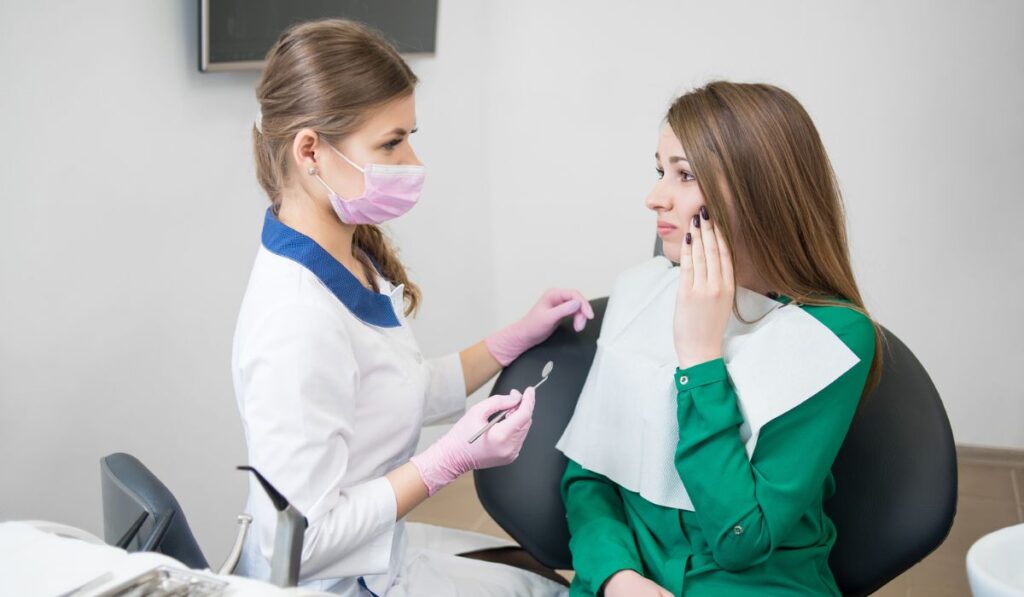A flash of pain in the tooth when eating is a discomfort many adults have to contend with. However, it should give you a head start on treating underlying dental problems and preserving healthy teeth. So, what causes tooth pain while eating, and how do you go about it?
Tooth pain while eating comes from enamel erosion and gum recession. Certain dental procedures can also be culprits. And if you have tooth cavities or a sinus infection, it’s something you expect to deal with.
So while you may be tempted to hold off on seeing or even skipping the dentist and go online to find answers, your best bet is to see your dentist and get it checked before it becomes a major issue. So now, let’s jump right in.
What Causes Tooth Pain While Eating?

Biting into some juicy fruit once you’ve had a chance to wind down seems all good until it’s followed by a nasty flash of pain inside one tooth. Of course, the sharp pain could also emanate from a couple of your teeth; in this case, it often stings enough to drive you nuts.
Generally, the pain can be mild or severe, and you can feel it in the upper or lower teeth. You could put some Anbesol Oral Pain Relief Gel (on Amazon) on the tooth, or sore area, or you could gain some temporary relief from something like Orajel (also on Amazon), but what about treating the root cause?
Dentists also point out that depending on your dental history, it often boils down to one or two causes. Here’s why you could experience a sharp burst of pain while eating:
You Have a Thin Tooth Enamel
Studies have shown that nearly 12 percent of adults have had some dentin hypersensitivity that causes them pain while eating. It means the enamel (hard outer cover of the tooth) is thinning due to vigorous brushing and a highly acidic diet.
Remember, once enamel wears out, it can’t be replaced. This only exposes the delicate inner layer with lots of nerve endings. That’s why you’ll experience sharp, stabbing pain when you bite into some foods.
It’s a Side Effect of Dental Procedures
If you’ve had dental work recently, you’ll most likely have to deal with temporary inflammation that leads to pain while eating. Here’s a quick highlight of the kinds of treatment that cause this kind of discomfort:
- Fillings
- Root canal treatment
- Pressure from braces
- Bonding
- Crowns
- Veneers
Your dentist will often tell you the potential side effects of the treatment for your case, so you brace up for discomfort once in a while.
Fortunately, with modern breakthroughs in dentistry, you only have to deal with these side effects over the short term, and in most cases, they’re rare. With braces, for example, the pain and discomfort while eating should only last a few days.
Gum Recession and Root Exposure
Gum recession often causes the tooth whose root is exposed to be extremely sensitive when pressure is applied, like when eating sometimes. You’ll also experience sharp pain on the affected tooth when foods at more extreme temperatures come into contact with its root surface.
You Have a Dental Abscess
A dental abscess is a swelling around the tip of the root of your tooth, right inside the jaw bone. It puts pressure against your tooth, leading to a throbbing pain that is worsened when you push down on it when biting.
Abscess swelling and drainage can come and go; the symptoms feel worse on some days and go undetected on others. A qualified dentist will perform a root canal procedure to deal with the abscess, ease your pain, and preserve your tooth.
It Could be Temperature Sensitivity
Once your tooth enamel is worn out or your tooth nerves are exposed, your teeth become sensitive and you’ll experience pain when taking hot or cold foods and beverages.
While the severity of one’s pain fluctuates, you’ll often feel a sudden, sharp burst of pain as soon as the food or drink gets into contact with your teeth. As it turns out, this problem commonly occurs due to loose fillings, exposed roots, and early stages of tooth decay.
Dentists recommend that you maintain good dental hygiene to check on plaque build-up. Brush your teeth properly with a soft-bristled brush twice a day. And if necessary, use ADA-approved toothpaste and rub it on your teeth for at least 5 minutes. Consult your dentist for more solutions and appropriate treatment.
You Could Have a Cavity
Tooth cavities often cause a lingering pain when you eat too many sweets such as flavored coffee, soda, pastry, and candy. If your cavities are large enough, food particles will stick in them and put pressure, making the pain stick around for longer.
Advanced tooth decay irritates the nerves inside your teeth, leading to painful flare-ups whenever you bite, chew, or put food in your mouth.
As it turns out, not all cavities hurt. But if you notice a strange sensation when you bite down, please schedule an exam with your dentist to have your teeth examined to prevent the condition from growing worse.
Symptoms of a Sinus Infection
A dental problem isn’t always the culprit if you feel tooth pain while eating—it could be because you have a sinus infection. The roots of your teeth are very close to your nasal tissues, meaning you can experience pain in your tooth or jaw if there’s an inflammation in your sinuses.
The molars and premolars usually become more sensitive when you have a sinus infection, which is also limited to the upper teeth.
Common signs and symptoms of a sinus infection include the following:
- A stuffy nose and thick yellow or green discharge from the nose
- Mucus dripping down the throat (post-nasal drip)
- Facial pressure and pain around the nose, eyes, forehead, teeth, and ears
- Bad breath (halitosis)
- Fever
- Fatigue
- Cough
Your Tooth Could be Cracked
A cracked tooth can cause pain while eating, but it’s typically one of the most challenging dental conditions to diagnose. This is because it has no apparent symptoms apart from the stinging pain when you bite down on it.
If you feel pain while biting or chewing, try to determine if it originates from a particular area in order to help diagnose the problem.
An experienced dentist will do a dental X-ray and have you champ on a special bite stick to see if the pain comes from pressure at a specific point. And while the X-ray may not show a cracked tooth, the bite stick can detect which tooth is causing discomfort.
When to Visit a Dentist

Unlike stubbing your pinky toe, you can’t just cross your fingers and expect tooth pain will go away over time. Curiously, ordinary painkillers won’t come in handy because toothaches point to something serious happening inside your mouth.
If you’ve newly started to experience tooth sensitivity when you have never had the problem before, please make an appointment with your dentist. They may recommend simple treatments like the application of sensitivity-reducing toothpaste.
An experienced dentist will advise if you need a corrective procedure, like tooth extraction, root canal, or a filling.
You shouldn’t ignore some symptoms, and as a rule of thumb, see your dentist right away if you experience the following:
- A thunderclap headache or migraine that extends to the teeth
- Toothache that goes beyond 48 hours
- A sharp pain that doesn’t ease up
- Fever that seems to have kicked in with the toothache


